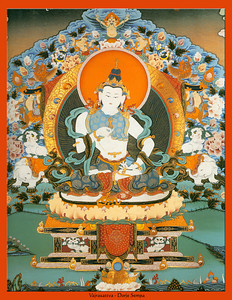An excerpt from the Mindfulness workshop given by Jetsunma Ahkon Lhamo in 1999
Another aspect of our Ngöndro practice is purification, the prayers to Vajrasattva. How would it be if we were to sit for maybe an hour and practice the purification and confession of Vajrasattva and accumulate the mantra and then just put our books aside and consider it’s over? That’s it. I confessed. I said all the prayers, the short ones and the long ones, short confession, long confession. Remember, if you practice like that, you never have to revisit it again. It’s a lazy, cop-out way to practice.
Instead, we should think, “I’m deeply involved in the practice of purification and confession which does not stop at the end of my practice.” There are so many ways to practice that kind of purification: by being mindful, by making offerings in the way that I’ve described, by moving into a state of better recognition about what is precious and what is ordinary, and ultimately moving into the state of Recognition of the nature of all phenomena. Automatically one is constantly purifying the senses, constantly purifying one’s intention, which is the very thing that needs purifying even more than everything else. If we practice in that way as we’re walking around, it complements any confessional prayers that we make.
In most of the confessional prayers, if you really read the meaning and content of the prayers, there is talk about broken samaya in the confessional prayers. Nobody really knows what that means. Does that mean you didn’t do your mantra today? Well, maybe on one level it means that, but on a deeper level, it is referring to the state of non-recognition. So in everything that we do, if we continually make offerings, as we continually give rise to a deeper Recognition, then the five senses are being purified constantly. The habit that I’m suggesting you develop will antidote the automatic reaction that is so natural for us, so habitual. Remember, we can insert this way of thinking or this way of practicing because we are human.
I really like animals, but one thing I’ve noticed about animals, even if they are trainable and very smart, they cannot change or alter the way they perceive their environment. They can’t do that. The dog can’t say, “Wait a minute, before I lift that leg, let’s think about the nature of that fire hydrant.” The dog is not capable of this. You are. That is one of the great blessings of being a human being, and yet the habits that we tend to cultivate are the habits that you don’t even need to be a human being to do: that habit of automatically reacting, not taking oneself in hand, not creating any kind of space or a moment where we can Recognize the nature of reality, not making any offerings. We tend to just automatically move through life like an automaton, like a robot.
However, being human, we can develop a little bit of space in our minds to antidote that constant clinging and reactivity, and yet we’re all about collecting things. Well, you know, crows collect things. We’re all about having relationships. Well, even animals can bond for life. We’re all about having children. Well, dogs and cats do that, too. Isn’t it wonderful that here in Dharma practice, if we choose to, if we practice sincerely, we can do that which only humans can do? How amazing!
© Jetsunma Ahkön Lhamo











